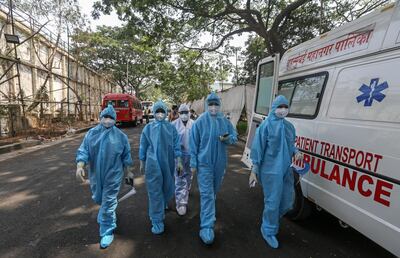Opec and its allies kept production curbs at current levels yesterday as it balanced "the continuing recovery in the global economy" with a sharp rise in cases in some countries.
A resurgence of Covid-19 cases despite vaccination campaigns "could hamper economic and oil demand recovery”, the group warned following a meeting of its joint ministerial monitoring committee.
After agreeing to maintain its current pact, Opec+, which is led by Saudi Arabia and Russia, cancelled a ministerial meeting planned for Wednesday and will next convene on June 1.
The group expects demand recovery to pick up "in the second half of the year", supported by large volumes of fiscal and monetary stimulus.
Overall conformity among its members to existing supply restrictions reached 115 per cent in March. While largely lauding the group's collective effort to cut volumes during the first quarter of the year, Opec+ said some countries had yet to reach 100 per cent conformity levels with the pact.
Producers should remain "vigilant and flexible given the uncertain market conditions", Opec+ cautioned.
Countries that flouted quotas have until September to make up for earlier over-production, the organisation said.
The devastating second wave of Covid-19 infections in India, the world's third-largest oil consumer, loomed over the group's proceedings.
Despite this, Opec+ raised its earlier growth forecast for demand growth by 400,000 barrels per day to 6 million bpd at a technical meeting on Monday.
"Despite the crude demand hit from India and Japan, the outlook has dramatically improved across Europe and provided an opportunity to stick to the three-month gradual increase plan made four weeks ago," said Edward Moya, senior market analyst, the Americas at Oanda.
Oil prices remained elevated after the Opec+ meeting.
Brent, the international benchmark, under which two-third's of oil is traded, was up 0.44 per cent at $65.94 per barrel at 9.24pm UAE time. WTI, which tracks US grades, was up 0.82 per cent at $62.42 per barrel.
Prices also rallied earlier after reports of separate maritime incidents offshore Saudi Arabia and China.
Saudi Arabia's defence ministry said it destroyed an explosive-laden boat off the Yanbu port in the Red Sea. In China's Yellow Sea, an oil spill occurred when a Suezmax tanker collided with a dry bulk carrier. A Suezmax has the capacity to carry up to one million barrels of oil.
Opec+ plans to incrementally add a total output of 2 million bpd by July, despite the growing surge of Covid-19 infections in India.
The country of 1.37 billion people is in the grips of a devastating second wave of Covid-19, with 314,554 new cases and 2,509 deaths on Tuesday, according to Worldometer, which tracks the pandemic. India has registered more than 1.3 million infections in the past four days.
The country's fragile health infrastructure has buckled under the volume of new cases and the daily infection rate could rise to 440,000 by May 8, scientists from the Indian Institute of Technology in Kanpur and Hyderabad said on Tuesday.

The surge in cases could lead to nationwide lockdowns that would crimp energy demand and derail an economic recovery. India's economy was set to expand 12.5 per cent this year following an 8 per cent contraction in 2020, according to the International Monetary Fund.
A continuing surge of cases from India well into the summer could undo the plan by Opec+ producers to continue to add supply to the markets. The group plans to increase output by 350,000 bpd in May and June and will add 450,000 bpd in July.
Saudi Arabia, which had supported the group's restrictions by volunteering to cut 1 million bpd until April, will phase out the curbs from May onwards.
Riyadh will cut 250,000 bpd in May, 350,000 bpd in June and 400,000 bpd in July.
"Whether or not the market will be able to sustain that level of increase depends on how badly demand is being affected by the current rise in the number of Covid-19 cases in India and resultant lockdowns in key centres of the economy," Emirates NBD said in a note on Monday.
Refineries in India have already lowered their processing rates due to significant decline in demand across the country.
"As the daily number of new cases has yet to hit a plateau the near-term economic hit is likely to be sharp and may feed into the summer months," Emirates NBD said.


